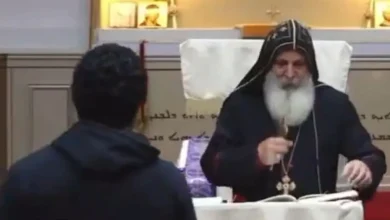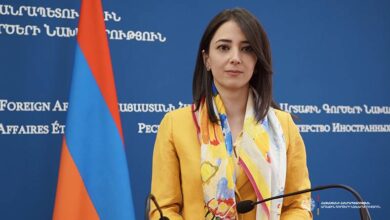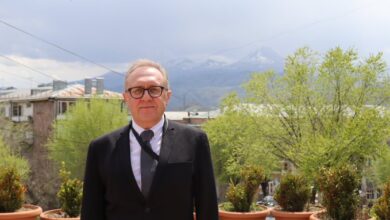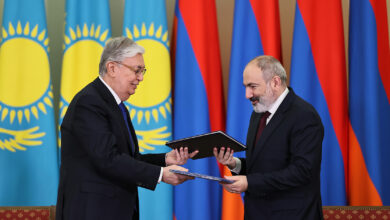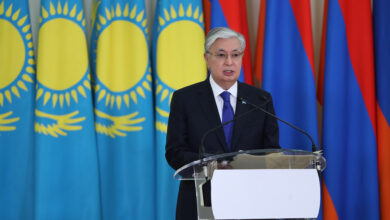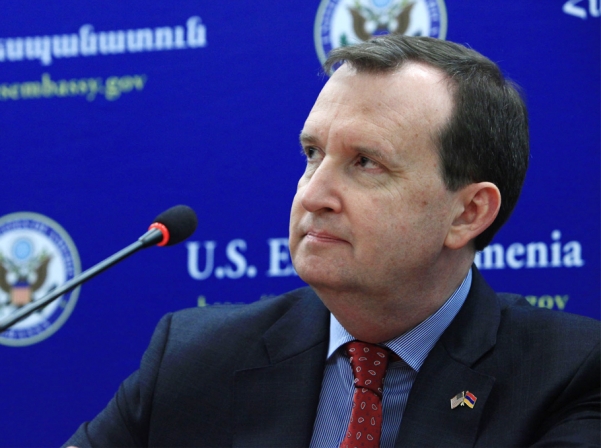
US Ambassador to Armenia Richard Mills spoke out to members of the American Chamber of Commerce in Armenia, laying out the priorities for his time. Remarks by Ambassador Mills are provided below:
“Deputy Minister of Economy Sergey Avetisyan, Chief Advisor Hovhannes Azizyan, and representatives the Ministry of Foreign Affairs, AmCham President Tigran Jrbashyan, and Members of the AmCham Board of Directors, Distinguished Guests, I am delighted to be here tonight. The Embassy has no better partner in Armenia for promoting trade and economic growth than the Chamber, and I want to thank our friends at AmCham for their warmth to me since I have arrived in Armenia, and for hosting this event. My wife, Leigh, and I have been touched by the warm welcome we’ve received from all the Armenian people we’ve encountered in our initial travels, and we’re delighted to have the opportunity to explore your beautiful country and rich cultural heritage. I have been in Armenia for nine months this week and have been able to use that time to listen and learn –from Armenian officials, from the Armenians young and old I have met across the country, from Armenia’s friends in the Armenian-American community, and from U.S. business people like the Chamber. I wanted to take this time to listen so that I could use what I learned to help shape my own priorities as the U.S. Ambassador to Armenia. Tonight, I want to share with all of you what those priorities are and what they will mean for the U.S. Embassy’s programs and public dialogue during my tenure.
Let me begin by saying that since arriving here nine months ago, I’ve also seen first-hand the great strides Armenia has made since its independence and this too has shaped the priorities I will lay out tonight. The quality of life, compared to the beginning of the 1990s, has improved immensely. Armenia has a stable government that is striving to improve delivery of services; a robust civil society; an educated workforce; a vibrant IT sector with clients across the globe; and a flourishing agricultural sector. And I am pleased the close ties between the United States and Armenia have continued to intensify over the last two decades.
But for all the very real achievements since 1991, there are also areas where progress has been halting, or has outright stalled. It is disheartening that the Nagorno-Karabakh conflict remains unresolved and the border with Turkey is closed. The U.S. government will continue to pursue government to government and people to people efforts in order to advance the resolution of these issues. Regarding Nagorno-Karabakh, the U.S. Government remains committed to helping the parties reach a peaceful, negotiated settlement via the Minsk Group process. With regard to Turkey, we urge both sides to remain open to efforts at reconciliation and normalization, which will promote stability and prosperity in both countries.
Before I arrived in Yerevan, President Obama and Secretary of State Kerry conveyed to me this message: The U.S. Government’s broad goal in its relationship with Armenia is a democratic, prosperous, secure Armenia at peace with its neighbors. And that overarching goal underpins the four priorities that I have set for the Embassy’s work while I am ambassador. I want to share those priorities with you tonight, for the sake of transparency. After all, if I am going to call for accountability in Armenia, I need to hold my work, and that of the Embassy, to the same standard.
My first priority will be to deepen the business and trade relations between our two countries. Let me be clear, I am not talking about new aid programs, but trade – the strengthening of our joint commercial ties to the benefit of both our economies. This is not a new focus; our countries have always been interested in expanding our trade and investment relationship. What is new is the U.S. Embassy’s assessment that the Armenian economy has reached a level that offers significant new opportunities for commercial relations and investments in a range of sectors. The kind of trade opportunities that merit both governments taking the sometimes difficult steps to synchronize trade-related regulations, legal regimes and customs law. For that reason just this May, the U.S. and Armenian governments established a high-level forum to explore new ways to develop our economic partnership by committing resources to expand bilateral trade. This Forum is the U.S.-Armenia Council on Trade and Investment, also known as the TIFA Council.
I am delighted to announce that the first meeting of the TIFA Council will take place in Yerevan next week, on November 17, with the participation of representatives from the office of the U.S. Trade Representative and other agencies. During the day-long TIFA session, we will discuss key trade topics related to customs, intellectual property rights, non-tariff trade barriers, and government procurement. We will also establish private sector consultation mechanisms. For me, the private sector consultations are one of the most exciting components, because they will serve as a guide for the government-to-government talks, ensuring we are advocating on the issues that are of importance to business, to people like you in this room. In fact, we plan to organize a separate session with business organizations during the TIFA meeting.
On November 19, just after the TIFA Council session, we will hold the annual meeting of the U.S.-Armenia Task Force, or USATF. The goal of the USATF is for both governments to engage in a big-picture economic policy dialogue on important issues that will influence Armenia’s economic growth and trade for years to come. This year, discussion items include fighting corruption, Armenia’s future energy strategy, water management, civil aviation and Open Skies, the unified tax code, and the Extractive Industries Transparency Initiative, which I’ll touch upon later.
One of the key areas we’re looking at, when exploring ways of expanding our business ties, is the prospect of boosting U.S. direct investment in Armenia. We’re proud that the United States is among the largest foreign direct investors here. U.S. investment in Armenia got a real boost with ContourGlobal’s acquisition of the Vorotan Hydroelectric Cascade, a 250 million dollar deal that brings to Armenia the technical expertise and management techniques of one of America’s most innovative energy companies. I want to emphasize that Contour Global made this investment, and received the support of the Armenian government, because it made good commercial sense. Now, let me stress something that all of you in this room know — the U.S. Embassy cannot force U.S. businesses to invest in Armenia. It is up to Armenia to attract that investment, as it did in the case of Contour Global. Fundamentally, companies invest where there is predictability and transparency, in everything from taxation to customs regulations to court proceedings. Therefore, the U.S. Embassy will focus its work on helping to create a business environment in which all companies – Armenian, American, Russian or whatever –can compete fairly, thus increasing investor confidence. In discussing U.S. investment in Armenia, I’d like to highlight two recent activities the Embassy organized to boost U.S. investment in Armenia, which are examples of what I want to see more of in coming months. We organized a U.S. Franchise Day in September, which brought to Yerevan several U.S. companies interested in franchise opportunities here. We also hosted a U.S. Partnership Opportunity Delegation in October that explored cooperation in the renewable energy sector. I am working with my staff to organize more such events in the future and we will be seeking input from the Chamber on how to make those events as useful as possible.
I want to emphasize that our support for economic growth in Armenia puts great emphasis on the regions. For instance, the U.S. Government has been actively helping to develop the Armenian agricultural sector for more than 20 years. The sector employs 40% of the Armenian labor force and accounts for 20% of Armenian GDP, so agriculture is vitally important to the health and growth of the overall Armenian economy. Our agricultural support programs now implemented by USAID currently provide about $12 million in assistance to boost the competitiveness of Armenian agriculture and grow the economies of rural communities.
In addition to our sustained partnership in the agricultural sector, we have also explored other means of boosting rural development. For example – and unfortunately, I can’t give too much away – we’ll be announcing later this month a very exciting tourism initiative, in cooperation with the Smithsonian Institution in the United States, that I believe will inject a burst of oxygen into the economy of rural Armenia.
And now, let me return to the importance of predictability and the necessity of ensuring a level playing field for businesses as I pivot to my second priority: the fight against corruption.
I must be frank with our Armenian friends about the very real toll that corruption exacts on Armenia. I hear about that toll from potential U.S. business investors and from average Armenians as I travel the country. When competition among businesses is not fair and not based on objective commercial criteria, when there are powerful interests that have disproportionate economic and political influence, it limits economic growth. The whole economy – indeed the whole country –suffers. Foreign businesses vote with their investment dollars; if they see a country suffering the ills of corruption they either don’t invest at all, or may decide to pull their money out. Among Armenians, the burden of corruption falls on the most vulnerable, the small business owners struggling to start and maintain their operations.
But corruption affects more than just the economy. Corruption undermines democracy and rule of law. It breeds instability and mistrust in institutions, and it can threaten a nation’s national security.
Of course, corruption happens everywhere, including in the United States. The key questions for any nation are whether there is political will to attack corruption, whether the media and civil society feel empowered to speak out against corruption, and whether there are reliable judicial processes in place to investigate and prosecute the cases that are brought to light.
My decision to devote U.S. Government attention and resources to fighting corruption is not one made in a vacuum. The impetus comes from the very top of the U.S. Government. In his 2015 National Security Strategy, President Obama outlines why America – at all levels and in all sectors – is partnering with nations and institutions fighting corruption across the globe. With that in mind, let me explain how I, and our Embassy here in Yerevan, plan to tackle this issue.
First of all, we will continue to work with any Armenian governmental or non-governmental institution that demonstrates a commitment to fighting corruption. This will include U.S. Embassy grants to NGOs engaged in anti-corruption activities and that cooperate with government bodies that make progress in fighting corruption and increasing transparency. Our work will also include support to the Government’s Anti-Corruption Council. Our financial assistance to the Council supports concrete activities, such as the continued development of its anti-corruption strategy and the establishment of an action plan. I would like to emphasize that we have conditioned our support to the Council on the attainment of measurable achievements. If the Council does not deliver, our support will end, plain and simple. We also encourage NGOs to serve on the Anti-Corruption Council, for we see it as an opportunity for civil society to constructively engage in direct dialogue with the government.
Secondly, the U.S. Embassy will continue to help civil society shine a spotlight on corruption and combat it. This past August and September, for example, I believe the U.S. Embassy helped expand the conversation about corruption in Armenia through a series of programs and events that culminated with my interview on Radio Free Europe/Radio Liberty. You can expect the U.S. Embassy to carry out similar anti-corruption-focused efforts in the future.
I would like to focus for a moment on the Extractive Industries Transparency Initiative, or EITI, as it is an important anti-corruption initiative in which the Prime Minister has demonstrated true leadership. We were delighted by his announcement this past summer that the Armenian Government intends to join the EITI. EITI requires that the government, civil society, and mining industry in Armenia come together to bring more transparency to the mining sector and foster the clean, sustainable development of the industry. Much work remains to be done before Armenia can achieve its goal of becoming first an EITI candidate, and ultimately an EITI compliant country. The Embassy stands ready to assist Armenia as it prepares its EITI candidate application.
Turning now to my third priority–our continuing efforts to strengthen democratic institutions, human rights, and civil society in Armenia.
It was Winston Churchill who famously said, “Democracy is undoubtedly the worst form of government, until compared to all the other options.” We agree: my government firmly believes that democracy, for all its faults, is worth the work it requires because democracy is rooted in the will of the people, and therefore does a better job than any other form of government of respecting the rights and opinions of individuals, of solving problems peacefully, and of building prosperity. And one of the necessary ingredients in a functioning democracy is a strong and independent civil society. This explains why the U.S. Government and Embassy place so much emphasis on strengthening the rule of law, human rights, civil society development, and the empowerment – including civic and political participation – of women, individuals with disabilities, and minority populations. Rest assured, we will continue to place such emphasis.
I am encouraged by what I have seen in Armenia these past nine months. While progress remains to be made, particularly in rural regions, I have observed a vibrant civil society that does not hesitate to voice criticism. In fact, I assess that Armenian civil society is, after the Baltic nations, among the most vital and active in the former Soviet Union.
Many non-governmental organizations in Armenia cooperate effectively with government institutions, and we strongly support this trend. I think one of the most successful examples of government-civil society partnerships I’ve seen is the Trafficking-in-Persons Inter-agency Working Group, which represents virtually all Armenian government ministries, civil society representatives, and international organizations that work to stop the scourge of the trafficking-in-persons.
While such examples of effective government and civil society cooperation exist, much more is needed. I want to encourage both the Armenian government and civil society organizations to more fully embrace constructive engagement. Too often, the Armenian Government does not reach out to civil society to consult on matters of shared interest or to take advantage of their expertise. And when opportunity does present itself, civil society is sometimes skeptical and hesitant to engage with the Government.
Members of civil society must take the lead in constructively pushing for the reforms they want to see in their country. Protests can galvanize the public and serve to create an environment for change, but setting realistic goals, engaging with government, and building advocacy are equally important and require both patience and dedicated work. Our message to civil society is this: develop your organizational and advocacy capacities and build up local constituencies. Become independent and financially sustainable. That is what Armenian society needs: strong, savvy, and financially sustainable NGOs that can represent the needs and concerns of their constituencies.
I have spoken at length about Armenia and the areas of partnership and engagement that we will be prioritizing. I would like to end by talking more about my own country. My fourth and last priority is that we – the U.S. Embassy and I personally – need to do a better job of explaining U.S. policies, not our bilateral policies and shared goals with Armenia, but towards the world in general. Although information seems but a keystroke away in our world of Internet connectivity and mobile devices, many Armenians I’ve spoken with tell me that they do not understand broader U.S. foreign policy; they do not understand how the values the U.S. promotes around the globe will make the world more secure, prosperous and free. They say it is difficult to find opportunities to hear the official U.S. message. To me, that means the Embassy has to communicate those messages more clearly and look for opportunities to address new audiences in Armenia. So going forward, we will be exploring various avenues for explaining U.S. policy goals to different audiences, both by me and by members of my Embassy staff, many of whom are here tonight.
With that priority in place, I am going to take advantage of the opportunity my appearance before this prestigious and important audience presents to briefly discuss two aspects of U.S. foreign policy that are of particular interest to Armenia and its neighborhood – our relations with Russia and Iran.
Our overarching goal on the European continent, one that we have been working on for 25 years, is a Europe — whole, free, and at peace. We and our transatlantic allies stand for democratic choice, collective security, peace, tolerance, and prosperity. These are our values, and we affirm them with pride. The challenges we’ve faced in recent years – Russian aggression in Ukraine, the fight against ISIL, and the Syrian civil war – have reinforced our dedication to these values and strengthened the bonds we share with our Euro-Atlantic allies.
It is no secret that the United States and Russia have some stark policy differences at the moment, especially with regard to Ukraine and Syria. However, we have sought and found common ground and cooperation on other issues, most notably on the Iran nuclear issue and also within the OSCE Minsk Group process.
But, fundamentally, there is a current of distrust between the U.S. and Russia, and I am asked often by Armenians about how this affects the way we view the Armenian-Russian relationship. Let me say that we recognize, as a reality of geography and history, that there is a significant Russian presence in Armenia, and that you have strong, historical ties. I believe, as I think most Armenians do, that this strong Armenian-Russian relationship, and Armenia’s memberships in the Eurasian Economic Union and the Collective Security Treaty Organization, should not and do not preclude Armenia from also pursuing strong, mutually beneficial relations with the United States, the European Union, and other potential partners, as well as with organizations like NATO and the Council of Europe.. These relationships are not mutually exclusive. It is not a zero sum world.
On the broader question of U.S. views towards Russia, let me quote Assistant Secretary of State Victoria Nuland, who spoke to this in her January 2015 speech at the Brookings Institution: “We reject the narrative of grievance that is popular in Moscow today that we wanted a weak Russia – nothing could be further from the truth. What we wanted, what we still want, is a strong, democratic Russia that respects the rule of law at home and abroad, and its neighbors’ sovereignty; a Russia that works with us and with Europe to build peace and security. The United States alone spent more than $20 billion dollars since 1992 to help Russia strengthen and open its economy; promote good health in Russia, clean and more open governance and elections, non-proliferation, and closer ties between Russia and NATO, including joint operations and exercises. But that kind of cooperation can’t continue when Russia tramples on the rules of the international system, when it bites off pieces of its neighbors’ territory and tries to bully them into economic and political submission.
But the off ramp for Russia – the route back to better ties with all of us – is very simple: the minute Russia allows Ukraine to control its side of the international border and stops fueling the conflict, the situation will improve. The weapons and fighters will stop flowing. Hostages will come home. Sanctions can start to roll back. And the fight that Moscow calls an intra-Ukrainian problem will become just that. Ukrainians, with our support, will have the opportunity to work through the legitimate grievances of those in the east; to rebuild the political, economic, and cultural structures and ties that should bind a democratic Ukraine; and to give the people of the Donbas a chance to decide their own future peacefully, lawfully, and constitutionally – the very thing Moscow always says it wants.
Since Armenia and Iran enjoy neighborly relations, let me also speak briefly about what I consider an extraordinary achievement: the adoption of the Joint Comprehensive Plan of Action, or JCPOA, on October 18. That marked an important milestone in our goal of preventing Iran from obtaining a nuclear weapon and ensuring its nuclear program is exclusively peaceful going forward. Now, let me say that the U.S. Government recognizes and appreciates how Armenia has worked to respect the international community’s sanctions on Iran over the years, at some cost to Armenia and its economy. This was a meaningful sign of how seriously Armenia takes its role in the larger international community. This kind of international unity made it possible to achieve the agreement via diplomatic means and remove the potential for an Iranian nuclear weapon.
Since there is enormous interest here in the outcome of the JCPOA, let me explain what happens next. We expect Iran will take all the necessary nuclear steps outlined in the agreement, and if those steps are completed and verified by the IAEA, the parties will have reached Implementation Day, or I-Day. If and when I-Day is reached, the U.S. Government and the international community will then be obligated to lift the relevant nuclear-related sanctions. But let me emphasize: for now, all sanctions remain in place, and the U.S. – with our international partners – is working to ensure that the IAEA has the resources it needs to verify that all of Iran’s JCPOA commitments are met.
I’ve mentioned a few specific foreign policy issues – Europe, Russia, and Iran. Let me step back a moment and address the big picture. As Secretary Kerry recently said: “We live in extraordinary complicated times. …And as we look ahead … our strategy is to lay the groundwork for solutions that will strengthen the community of nations for decades to come. To succeed in that, we must mobilize the help and the support of allies and friends across the globe because we can’t do it alone.”
On that note, I would like to praise Armenia for its strong and expanding participation in NATO and UN peacekeeping missions. Armenia has been a member of the NATO Partnership for Peace program since 1994, earning the praise and gratitude of NATO leaders for its contributions to NATO operations in Kosovo and Afghanistan, including its recent public commitment to remain engaged in Mission Resolute Support until it is accomplished. We also welcome Armenia’s participation in the UN peacekeeping mission in Lebanon, and potentially in Mali as well.
Armenia is a wonderful country that is achieving great things. I have seen many positive changes since I first started working on Armenian issues in the 1990s, changes that have benefitted the Armenian people. But more needs to be done. I believe the four priorities I’ve identified will help the U.S. Government and people provide the people and government of Armenia with the tools and resources it needs to find Armenian solutions to the challenges it faces. We at the Embassy will be working to increase our bilateral business and trade ties. We will be helping Armenians fight corruption. We will be partnering with Armenia to strengthen its democratic institutions and civil society. I promise a more robust engagement to explain the broad range of U.S. foreign policy goals. I invite you to judge the success of my ambassadorship by how strongly and faithfully we cleave to these goals.
Thank you all for your patience; I realize this has been a very long speech. But I hope it has been useful in furthering our close, collaborative dialogue. I hope I have the opportunity to speak with many of you personally during the second half of the evening. Thank you.




